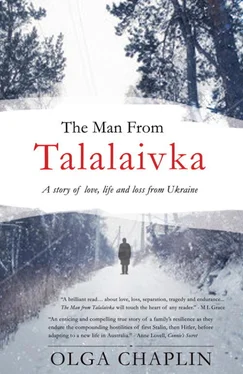Deep grey dawn surrendered to clear early morning light. It was summer, but the large austere reception room was icy. The old doctor, shoulders hunched, stood before Evdokia and Peter as they stirred from their slumped state. Still hopeful of Manya’s recovery, Evdokia at first did not fully comprehend. Peter, with his army and veterinarian’s training, sensed the worst. He had watched his adored first wife Hanya and infant son Mischa take their last breath in the horror year of 1930. He had steeled himself for this.
But Evdokia had not prepared herself, or her heart. Numb with shock and disbelief, Evdokia allowed her husband to take her to Manya, who lay pale and calm as if only in a deep sleep, then to lead her away, take her back to the kolkhoz farmhouse. The old doctor, concerned for Evdokia and her condition, used his dwindling authority to have Manya returned separately.
* * *
Evdokia, supported by the women from the kolkhoz farmhouse, followed Peter and their sons along the familiar path to the kolkhoz cemetery. Still numb, unable to accept the loss of her firstborn, she moved like a sleepwalker in an unending nightmare. The priest was already waiting for them; the gravediggers stood back from the mourners, their shovels ready. For a final time the coffin lay open, the priest sang his blessings for Manya’s soul. “Hospode pomelyue, Hospode pomelyue,” the mourners responded, crossing themselves; then, one by one, they passed by the little coffin and bowed their respects.
Peter, eyes filled with tears of anguish and loss, and pain stabbing at his heart, kissed Manya’s forehead, and moved closer to his wife. Evdokia leant for the last time to say goodbye to her little daughter, her beautiful little white kukla, in sleep forever. She touched the little hands, placed the tiny birthday trinket between the perfect, cold kukla fingers, kissed her little daughter goodbye, a silent prayer remaining permanently locked in her broken heart.
The well-worn pathway pointed Evdokia back to the kolkhoz farmhouse, to the cold wake, the tearful mourners, the sombre children. She let go of little Mykola’s hand, watched as he joined the other children ahead, glanced at the fields around her. The sunflowers were gone, the countryside almost denuded, desecrated, according to Comrade Stalin’s orders for the early harvest, for his war. There was little else to take from this countryside, in his ‘scorched earth’ policy.
She looked at Peter who, seemingly composed, was in deep conversation with other kolkhoz men, his attention momentarily diverted from her, from her personal grief. She could not know that their future life on the kolkhoz, and their safety, depended on his discussion with the soviet officials. Suffering, seemingly alone, her immense grief was too much to bear. Somewhere deep in her subconscious, an irrational logic buried itself: her gallant, capable husband, who had achieved so much despite the odds, had not found a way to save their child. It was this firstborn that she had willed herself to live for and give birth to in the horror famine years of 1931–1932, as she lay starving, before her husband’s desperate measures saved her. It could not have been for nothing.
The pain of the loss of Manya was never truly addressed. The tumultuous upheaval of Stalin’s war against Hitler, and the consequent occupation of her beloved Ukraine by Hitler’s armed forces, made insignificant a woman’s cry for help in her own personal despair. Thus there remained, deep within her, that invisible worm: of resentment, discontent, bitter disappointment, that ate at her unknowingly. It was to one day resurface from its dark core, to mark husband and wife irrevocably, permanently.

Chapter 20
Arustle, an indistinct sound somewhere in the dark pierced Peter’s subconscious, alerting him from fitful sleep. Blinking at his dream-state, he peered into the murky cavity of the kolkhoz farmhouse. A shadowy shape wavered, paused, moved silently to the door. Peter felt the pre-dawn chill of dewy air circle nearby, almost imperceptibly, as the shadowy figure disappeared into the night.
Peter shuddered, awakening, and hesitated. He crept across the hollowed room, his breath shallow, cupped his hand to the misted pane. All was black, silent, desolate. The grey night owl had long given its last cautioning call: it had already winged itself to another safety, its reflexed senses attuned to the warning drones.
Even before early morning light smeared the night sky, he quickly dressed to check his horse and staked the farmhouse parameter for any sign of tampering. All was unchanged. Heaving a sigh as he shrugged off his unease, he returned inside, reassured it was the dream. Then he noticed the gnarled wooden hook protruding from the far wall. The coat was missing.
“Dimitri never leaves without it,” he murmured, tensing again. He felt his way in the camouflaging darkness to check the soviet official’s bed behind its curtain. The panic bolted through him as the realisation hit, his intuition confirmed.
“He knows they’re close, now… that’s why he’s gone… without telling…”
He knew what this signified. Dimitri had slunk away to join Hresha, his senior kolkhoz official operating between the vital Talalaivka and Konotop railway junctions. As Bolshevik Party members, both these men knew it was paramount they retreat with the Russian troops before Hitler’s army overtook this region as it forged deeper and deeper into the Ukraine towards Moscow and Stalingrad.
“Then they must know the German army’s movements,” he calculated. He realised how hollow Stalin’s propaganda was in assuring all kolkhoz workers through these officials that the German armies had been stopped and were even retreating. Now he fully understood the import of those secretive gatherings between these soviet officials and frequent strangers who inexplicably called through the Talalaivka office these past weeks. And Stalin’s efficient spies were everywhere, reporting daily to the dictator through intermediaries, protected, at this pinnacle, by Khrushchev himself, Ukraine’s political commissar since the German invasion erupted.
Most importantly, Stalin’s men were warned ahead of all others of the panzer and light military ‘advance units’ fanning out hundreds of kilometres east of the barbarous fighting that was raging in and around Kiev right now, as a million soldiers from each side attacked each other. There was no knowing when these German advance units would strike. But Hresha and Dimitri knew they could not afford to be caught by these swift-moving soldiers in their lightning-like strikes: they would be summarily executed as Stalin’s Communist agents.
“My God, they’re really coming this way! Any time now they could be upon us!” he whispered to himself, looked again at Dimitri’s unslept-in bed. Even a few hours’ gain in distancing themselves from this region could give these officials advantage, protection out of reach of the Nazi invasion. His stomach felt the sickening pain of fear as he contemplated the likely consequences for all those remaining workers. He had to mentally prepare himself, after all those hollow assurances, and try to prepare Evdokia and the children. Everyone left at the farmhouse needed to stay fast, whatever befell them.
He looked about the emptied room, into the purple-grey darkness: the exposed bare rafters, all spare timbers and possessions gone. There was no place to hide, now. The kolkhoz farmhouse, stripped of everything that could be useful to Stalin’s war effort, was but a shell of its original dilapidated state. It was only saved from ‘scorched earth’ torching by these very same soviet officials who were now escaping to safety behind the ‘Stalin Line’. Peter shook his head, confronting the reality. The able-bodied men and soldiers were all gone to fight Stalin’s war; there was no-one left to protect these workers. He knew too well what risks lay ahead for all those remaining to guard the farms without even the ancient hoes with which to protect themselves. Now, like Hitler’s belligerent warnings, coming conveniently too late, Dimitri’s disappearance was prophetic.
Читать дальше













